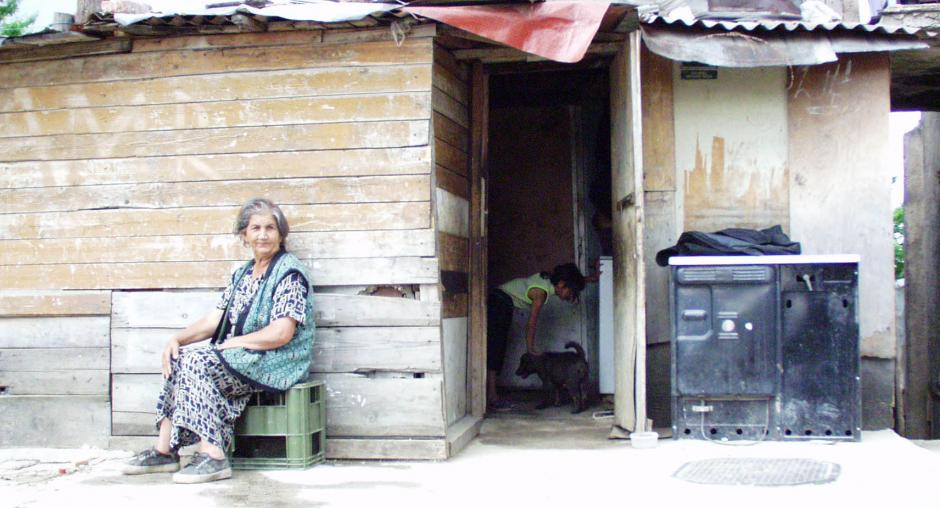Newsroom
OSCE BiH Mission welcomes measures to legalise Roma settlement in Brcko
SARAJEVO 13 May 2003

(OSCE)More than half of the Roma communities in Bosnia and Herzegovina still live in informal settlements. (OSCE) Photo details
SARAJEVO, 13 May 2003 - The OSCE Mission in Bosnia and Herzegovina (BiH) has welcomed the decision by Brcko district authorities to allocate apartments to 15 Roma families who have been living in an informal settlement in Prutace for many years.
Under current legislation, these families were to be evicted from the apartments this month. Following a meeting with the OSCE Mission, the Brcko district authorities decided to let the families continue to live in the informal settlement in Prutace and pledged to legalise it as a formal settlement of Roma community. This is a positive step by local authorities to resolve the housing issues of the Roma community.
About 50 to 70 per cent of Roma communities in BiH currently reside in informal settlements. These communities have no clear title to the land they occupy and many residents face forcible eviction by municipalities without any assessment of their rights or the provision of an alternative housing solution. The OSCE Mission is of the opinion that, under the Constitution of BiH, authorities are under a legal obligation to address the situation of all persons residing in informal settlements through legalisation of the settlements or the provision of alternative housing assistance. Housing policies should not be administered in a discriminatory manner, as has often been the case with members of the Roma community.
"The situation of Roma in Bosnia and Herzegovina is extremely poor. They are at the very bottom of the social ladder, they are subject to discrimination and enjoy few, if any basic social and economic rights," said Georgette Gagnon, Director of the Human Rights Department at the OSCE Mission.
"The positive steps taken to date in Brcko should form the basis of a countrywide policy that addresses the situation of informal settlements and the rights of vulnerable communities."
Not only did the Brcko authorities pledge to legalise the settlement, but they have also asked the Roma community representatives to provide them with a list of the most socially vulnerable families and a list of destroyed Roma houses to be included in future housing and reconstruction projects. The Mayor of Brcko District also agreed to provide a working space for the Brcko Roma Association that is to be funded from the municipality's own budget.
Under current legislation, these families were to be evicted from the apartments this month. Following a meeting with the OSCE Mission, the Brcko district authorities decided to let the families continue to live in the informal settlement in Prutace and pledged to legalise it as a formal settlement of Roma community. This is a positive step by local authorities to resolve the housing issues of the Roma community.
About 50 to 70 per cent of Roma communities in BiH currently reside in informal settlements. These communities have no clear title to the land they occupy and many residents face forcible eviction by municipalities without any assessment of their rights or the provision of an alternative housing solution. The OSCE Mission is of the opinion that, under the Constitution of BiH, authorities are under a legal obligation to address the situation of all persons residing in informal settlements through legalisation of the settlements or the provision of alternative housing assistance. Housing policies should not be administered in a discriminatory manner, as has often been the case with members of the Roma community.
"The situation of Roma in Bosnia and Herzegovina is extremely poor. They are at the very bottom of the social ladder, they are subject to discrimination and enjoy few, if any basic social and economic rights," said Georgette Gagnon, Director of the Human Rights Department at the OSCE Mission.
"The positive steps taken to date in Brcko should form the basis of a countrywide policy that addresses the situation of informal settlements and the rights of vulnerable communities."
Not only did the Brcko authorities pledge to legalise the settlement, but they have also asked the Roma community representatives to provide them with a list of the most socially vulnerable families and a list of destroyed Roma houses to be included in future housing and reconstruction projects. The Mayor of Brcko District also agreed to provide a working space for the Brcko Roma Association that is to be funded from the municipality's own budget.
